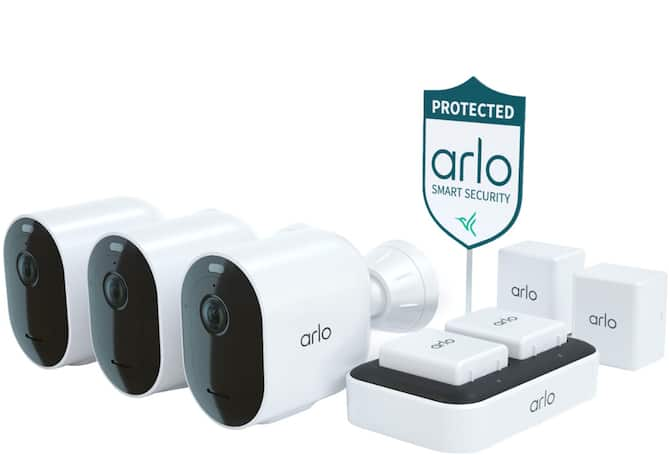How to Choose a Home Security System

Best Selling Products carousel(5 Items)
Protect your home and valuables with the right setup
Other than being a roof over your head, a home is a place where you want to feel protected and safe. Home security systems help protect your property and family from home intrusions, burglaries and environmental disasters. With the use of components, such as outdoor cameras for video surveillance, these systems help deter criminal activity. Modern security systems also feature home automation capabilities for increased convenience and energy savings. Since they lower the risk of theft or environmental hazards, a home security system may help reduce your home insurance premiums. Having cameras that record video footage will also help with your insurance claims in case of any loss due to crime or damage from water, fire or other natural disasters.
Are you thinking of installing a new security and alarm system? From complex models with multiple monitoring centers to do-it-yourself setups you can control from your smartphone, there is a wide variety of home security options to match your needs. Here are some tips on how to choose a home security system.
Common home security features and equipment
Cameras
Security cameras come in various designs and sizes. They include:
- Video baby cameras and monitors: These help watch over nurseries and children's rooms or monitor your pets when you're away.
- Spotlight cameras: A spotlight camera records video footage and lights up the surrounding area when it senses any movement.
- Motion cameras: Motion cameras record footage once they sense any motion.
- Smart doorbell cameras: These can help you verify people who request entry to your house.
Sensors
Sensors monitor the surrounding environment and alert you in case of any intrusion or issue. They come in an array of designs, such as:
- Door and window sensors: Entry sensors inform you when a door or window opens. They help guard your home's entrances and alert you in case children access rooms that are off-limits.
- Glass break sensors: Since they can sense loud noises, such as glass breaking, these sensors trigger alarms to ward off intruders who try entering your home by breaking windows.
- Motion sensors: Motion detectors alert you when they sense motion. Use them to inform you of unauthorized entrants to your home or to keep kids and pets away from dangerous areas.
Smart home integration
Wireless monitoring
Environmental sensors
These come in an array of designs to suit your unique needs. Based on your home's age, you may require environmental sensors such as:
- Flood sensors or leak detectors: These gadgets sense abnormalities in your plumbing system, such as leaks and pooling water. They prevent serious water damage to your property through prompt alerts.
- Carbon monoxide (CO) detectors: CO detectors sound an alarm when levels of CO are high in your home. Because they prevent potential suffocation, CO detectors can help save lives when you're asleep.
- Freeze sensors: These sensors alert you of any sharp drops in temperatures. Place them on or under plumbing systems to avert frozen pipes.
- Fire and smoke alarms: Avoid fires in your home using these devices. They sense and send alerts in case of extreme heat, smoke or fire.
Professional monitoring
Decide the level of protection you need
Determine your budget
Choose an installation method
Do you have some free time to work on a home improvement project? Then DIY home security systems are for you. These systems favor individuals with some level of comfort with electronic equipment. If you don't want the cognitive load of deciding which components to buy, choose a traditional security system that’s professionally installed.
Once you decide on the system, schedule a home consultation. Professional installers can help assess your unique security concerns and tackle technological challenges that may arise.
Wireless vs. hard-wired systems
A key consideration to make is how to connect your system components. If you’re living in a neighborhood with poor internet connectivity, then it's probably better to buy a wired system. When using wired systems, check out details like what type of wires to use. Some systems may require a dedicated landline connection.
Wireless systems are increasingly becoming popular because of their flexibility and easy installation. However, they require a reliable Wi-Fi network. Some come with downloadable applications you can use on your smartphone or tablet to simplify configuration. You can also enjoy a personalized experience with hybrid systems.
Choosing the right security system for you is a crucial part of securing your home and property. Consider your budget and specific needs to determine which home security system is best.